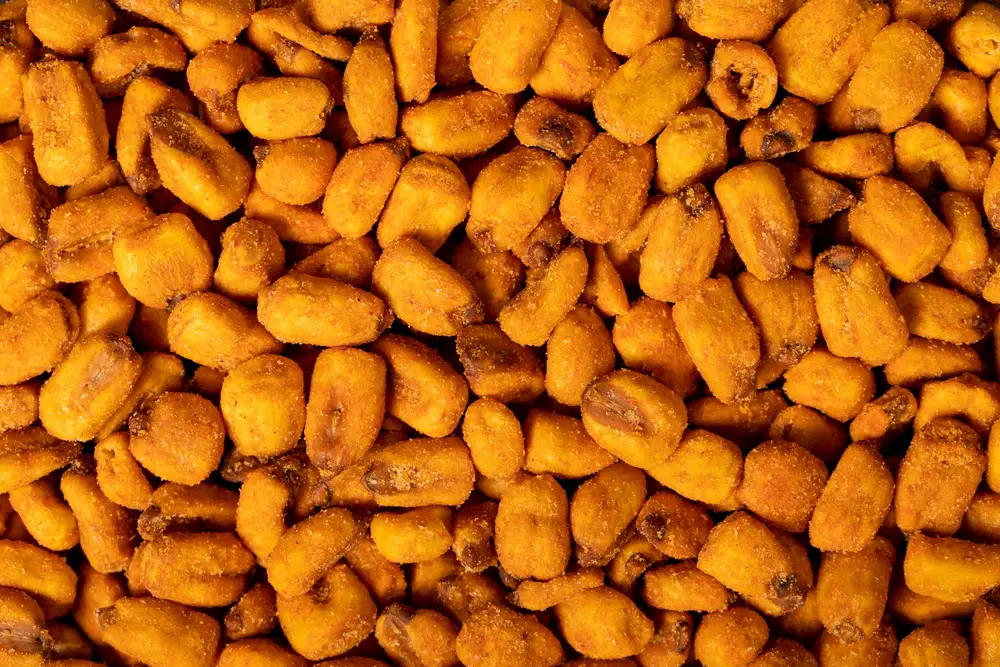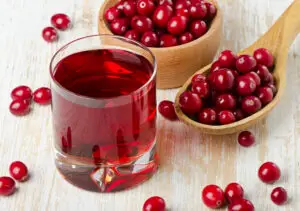Corn nuts, a popular snack choice, have been the subject of debate when it comes to their health benefits and drawbacks. Made by either roasting or deep-frying corn kernels, they offer a satisfying crunch and flavour. However, despite being derived from corn – a vegetable – their nutritional value comes into question.
Although corn nuts can be considered a low-calorie snack compared to some chips and crackers, moderation is key. The snack has a tendency to be high in fats if consumed in excessive amounts, which is something to keep in mind for those incorporating corn nuts into a healthy diet. The salt content is also a concern, as high sodium intake may have detrimental effects on overall health.
It’s important to weigh the pros and cons of this snack food when determining if corn nuts are a healthy choice. While they might not be a powerhouse of nutrition, their relatively low calorie count does provide them with an advantage in certain situations. Incorporating corn nuts into a balanced diet can still yield positive results, provided they are consumed in moderation and coupled with a variety of other healthy food choices.
What Are Corn Nuts
Corn nuts are a popular snack food typically made from whole-grain corn that is either roasted or deep-fried. They are crunchy and satisfying, offering a unique combination of flavour and texture. Although they may seem similar to nuts, corn nuts are not actually nuts, but rather a type of processed corn product.
In their simplest form, corn nuts are whole corn kernels that have undergone the roasting process. Roasting enhances the natural flavour of the corn while also providing that distinct crispiness that makes them so appealing. On the other hand, deep-fried corn nuts can be higher in fat content, but they offer a similar satisfying crunch. Regardless of the cooking method, they are commonly seasoned with various spices or salts, to give them a unique taste.
As a snack food, corn nuts can be incorporated into a healthy diet when consumed in moderation. They are a low-calorie choice compared to many types of chips and crackers, giving them an advantage in terms of calorie count. However, it is important to be mindful of serving sizes, as overindulging in corn nuts could lead to excessive consumption of fats and sodium.
Overall, corn nuts can be an enjoyable snack to satisfy those crunchy and salty cravings. By incorporating them into a balanced diet while being mindful of serving size, they can provide a tasty and satiating option whenever hunger strikes.
Nutritional Value of Corn Nuts
Corn nuts are a crunchy, savoury snack made from roasted or deep-fried corn kernels. They can be part of a healthy diet if consumed in moderation. In this section, we will explore the nutritional value of corn nuts, including their calorie content, macronutrients, and micronutrients.
A medium 57-gram single-serving bag of corn nuts provides around 180 to 225 kcal, which is lower in calories compared to many other types of chips and crackers. Corn nuts contain carbohydrates, fat, and some protein. For instance, a 1/4 cup (48 g) of corn nuts offers 4g of protein, making it not as high in protein as other snacks such as peanuts.
Regarding micronutrients, corn nuts contain certain important minerals, albeit in small quantities. A 95g serving of corn nuts provides 1.59 mg of iron, 8.55 mg of calcium, and 264 mg of potassium. However, corn nuts do not appear to offer significant amounts of vitamins such as vitamin A, vitamin C, or vitamin D, and fibre content is also quite low.
On the other hand, corn nuts can be high in fat, particularly saturated fat. A 95g serving contains 2.3g of saturated fat. Although fats are an essential part of our diet, it is essential to consume them in moderation and opt for healthier unsaturated fats when possible. Corn nuts may also have high sodium content due to added salt, so it is wise to choose varieties with reduced salt content.
To summarise, corn nuts can be a low-calorie snack option with some protein and minerals but are limited in vitamins and fibre. It is important to consume corn nuts in moderation, as they can be high in saturated fat and sodium.
Health Benefits of Corn Nuts
Corn nuts can be incorporated into a healthy diet when consumed in moderation. They are a low-calorie alternative to many types of chips and crackers, making them a preferable choice for a healthy snack.
One of the primary benefits of corn nuts is their protein content. While not as high as some other snacks, corn nuts do provide 4 grams of protein per 48 grams or 1/4 cup serving. Protein is essential for maintaining muscle mass and keeping you feeling satisfied after eating.
Another advantage of corn nuts is their potential to support heart health. As with other nuts, they contain unsaturated fat and vitamin E. These nutrients contribute to maintaining the health of the lining of the arteries, balancing cholesterol levels, and reducing the build-up of deposits called plaques. Moreover, this combination of nutrients is also associated with a lower risk of blood clots.
Corn nuts are also a source of dietary fibre. Fibre is essential for the proper functioning of the digestive system, and consuming adequate amounts can help maintain bowel regularity. Although corn nuts are not the highest fibre-containing snack available, they still offer some benefit in this regard.
In terms of antioxidants, corn nuts may not be as rich as other nut varieties; however, they still provide a small amount. Antioxidants offer protection against free radicals, which are responsible for cell damage and can contribute to various diseases.
In conclusion, while corn nuts may not be the most nutritious snack available, they do provide a range of health benefits when consumed in moderation. They can be a part of a balanced diet, offering a combination of protein, heart-healthy nutrients, fibre, and some antioxidants.
Potential Downsides
Corn nuts, while a popular snack option, have certain drawbacks that may impact one’s health. One of the primary concerns is their high sodium content. Consuming excessive sodium can lead to increased blood pressure, putting individuals at risk for heart disease and heart attacks. It is essential to monitor sodium intake, especially for those already dealing with high blood pressure.
Another potential downside is the presence of saturated fats in corn nuts. While they might not possess cholesterol, the saturated fats can negatively influence cholesterol levels in the body, further increasing the risk of heart problems. It is crucial for individuals to maintain a healthy balance of fats in their diet, limiting saturated fats and incorporating more unsaturated fats to promote heart health.
Additionally, the process by which corn nuts are made can impact their nutritional value. Corn nuts are generally either toasted or deep-fried, and although the toasted variety may be a slightly healthier option, both methods result in a final product that is less nutritious compared to other snack options. Deep-frying, in particular, can lead to higher levels of unhealthy fats, making it essential for consumers to be mindful of their choice.
In conclusion, while corn nuts may be a tempting snack, it is essential to consider their potential downsides, such as high sodium content, saturated fats, and preparation methods, before indulging. Moderation and balance are key when incorporating corn nuts into a healthy diet.
Comparing Corn Nuts with Other Nuts and Snacks
Corn nuts are a popular snack that can be considered as part of a healthy diet when consumed in moderation. They are a good source of carbohydrates, providing 34g per 48g serving, along with 4g of fibre that helps keep you satisfied between meals.
Comparing corn nuts with other nuts such as peanuts, almonds, hazelnuts, walnuts, macadamia nuts, pecans, and Brazil nuts, each nut variety provides different nutritional benefits. For example, almonds are rich in vitamin E, magnesium, and healthy fats, while walnuts are known for their high omega-3 fatty acid content. Overall, nuts often contain higher protein and fibre content than corn nuts.
Peanut butter makes for a versatile high-protein snack, although it is essential to choose a natural variety with minimal additives such as sugars or unhealthy fats. It can be easily paired with fruit or spread on wholemeal toast for a satisfying breakfast option.
In contrast with cereals and other breakfast options such as porridge, corn nuts may be lower in added sugars. This makes them a healthier alternative to typical cereal-based snacks. Fruits, both fresh and dried, also make nutritious and natural sugar-free snack options. Banana, for example, serves as a handy on-the-go snack and a source of potassium and fibre.
Addressing snack options like popcorn, it stands as a relatively low-calorie option, with air-popped popcorn containing significantly fewer calories than corn nuts. However, toppings like butter or sugar can alter the nutritional profile, making them less healthy.
When comparing corn nuts with other nuts and snacks, it is important to consider your specific nutritional needs, lifestyle, and preferences. While they are not as nutrient-rich as certain nuts, corn nuts can still be incorporated into a balanced diet. Keep in mind that moderation and variety are essential for achieving optimal health and enjoying a wholesome range of snacks.
How to Incorporate Corn Nuts into a Healthy Diet
Corn nuts can be a nutritious addition to a healthy diet when consumed in moderation. They provide a good source of carbohydrates and fibre, which helps in keeping you satisfied between meals. However, there are some precautions to consider to make the most out of this crunchy snack.
One way to incorporate corn nuts into your diet is by using them as a topping for salads or mixing them with low-fat yogurt. This will not only provide an interesting texture to your meals but also bring some additional nutritional benefits.
Being conscious of portion sizes is vital when consuming corn nuts. Opting for a low-calorie serving can make a difference in preventing overconsumption that may lead to weight gain. As corn nuts are relatively high in energy, it is important to keep serving sizes in check.
Regular consumption of a variety of nuts can contribute to a lower risk of cardiovascular disease, type 2 diabetes, and some forms of cancer. Although corn nuts are not among the healthiest nuts available, they still have their merits in terms of fibre and protein content. Combining corn nuts with other types of nuts will help balance out the overall nutritional value.
In order to maintain a sustainable and healthy diet, ensure that these snacks are unsalted and uncoated, as unnecessary additives can counter their benefits. Monitoring your intake and opting for unprocessed varieties will support your long-term health goals without depriving yourself of this tasty snack.
Conclusions: Are Corn Nuts Healthy?
Corn nuts can be considered a healthy snack when consumed in moderation as part of a balanced diet. They are a good source of fiber, protein, and essential vitamins and minerals. However, it is important to keep an eye on the calorie and fat content as well.
The calorie content of corn nuts is relatively low when compared to many types of chips and crackers, which makes them a more favourable choice for those looking to maintain a healthy lifestyle. Nevertheless, they can become high in fats if consumed in large quantities, so it’s crucial to stick to appropriate serving sizes.
When it comes to fat content, corn nuts contain a small amount of saturated fat, which should be kept to a minimum in a healthy diet. The majority of the fat in corn nuts is unsaturated, which is a healthier type of fat that may help lower cholesterol levels.
In addition to their protein and fiber content, corn nuts also provide a small amount of iron, which is essential for oxygen transport in the body. However, they are not abundant in other vitamins and minerals.
One downside of corn nuts is their sodium content, which can be quite high. Excessive sodium intake has been linked to an increased risk of high blood pressure and other health issues. If choosing corn nuts as a snack, it’s wise to opt for a low-sodium variety if available.
The sugar content of corn nuts is negligible, making them a suitable snack option for those looking to limit their sugar intake. As for digestion, their high fiber content can aid in promoting healthy digestion and preventing constipation.
In summary, corn nuts can fit into a healthy diet when consumed in appropriate quantities. They offer a fair amount of fiber and protein, while providing some essential nutrients. However, it’s essential to monitor their sodium and fat content and choose healthier varieties when possible.
My name is Ellis Francis and I have been a personal fitness trainer, sports nutritionalist and health and fitness advisor for over 25 years. I am the lead health and fitness advisor at https://awellnessbody.com.







